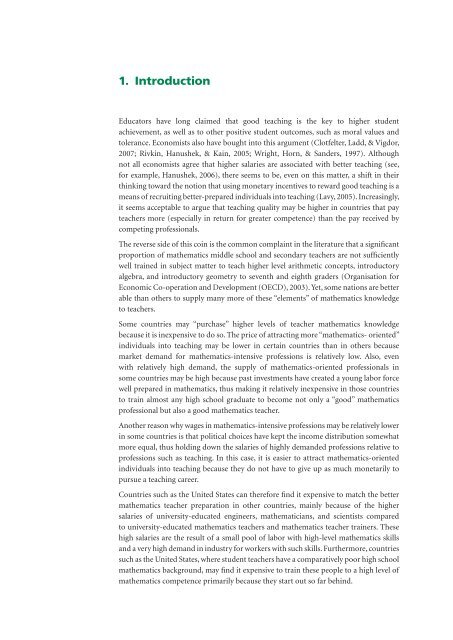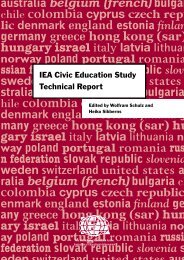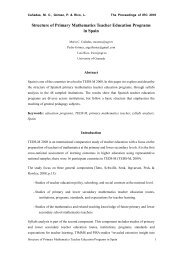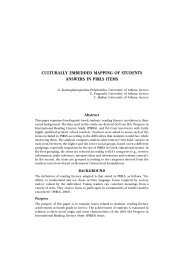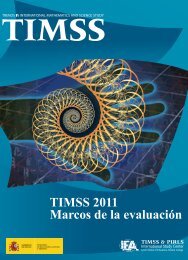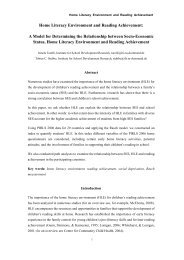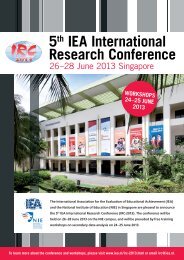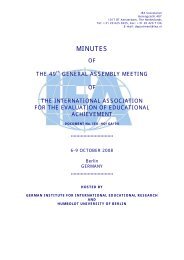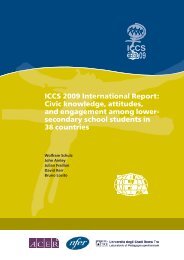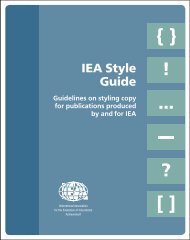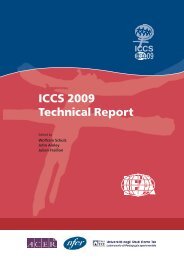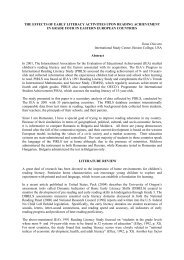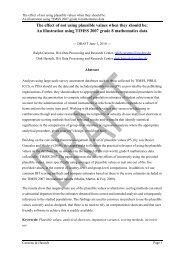Teacher Education and Development Study in Mathematics - IEA
Teacher Education and Development Study in Mathematics - IEA
Teacher Education and Development Study in Mathematics - IEA
You also want an ePaper? Increase the reach of your titles
YUMPU automatically turns print PDFs into web optimized ePapers that Google loves.
PART 1:<br />
17<br />
1. Introduction<br />
Educators have long claimed that good teach<strong>in</strong>g is the key to higher student<br />
achievement, as well as to other positive student outcomes, such as moral values <strong>and</strong><br />
tolerance. Economists also have bought <strong>in</strong>to this argument (Clotfelter, Ladd, & Vigdor,<br />
2007; Rivk<strong>in</strong>, Hanushek, & Ka<strong>in</strong>, 2005; Wright, Horn, & S<strong>and</strong>ers, 1997). Although<br />
not all economists agree that higher salaries are associated with better teach<strong>in</strong>g (see,<br />
for example, Hanushek, 2006), there seems to be, even on this matter, a shift <strong>in</strong> their<br />
th<strong>in</strong>k<strong>in</strong>g toward the notion that us<strong>in</strong>g monetary <strong>in</strong>centives to reward good teach<strong>in</strong>g is a<br />
means of recruit<strong>in</strong>g better-prepared <strong>in</strong>dividuals <strong>in</strong>to teach<strong>in</strong>g (Lavy, 2005). Increas<strong>in</strong>gly,<br />
it seems acceptable to argue that teach<strong>in</strong>g quality may be higher <strong>in</strong> countries that pay<br />
teachers more (especially <strong>in</strong> return for greater competence) than the pay received by<br />
compet<strong>in</strong>g professionals.<br />
The reverse side of this co<strong>in</strong> is the common compla<strong>in</strong>t <strong>in</strong> the literature that a significant<br />
proportion of mathematics middle school <strong>and</strong> secondary teachers are not sufficiently<br />
well tra<strong>in</strong>ed <strong>in</strong> subject matter to teach higher level arithmetic concepts, <strong>in</strong>troductory<br />
algebra, <strong>and</strong> <strong>in</strong>troductory geometry to seventh <strong>and</strong> eighth graders (Organisation for<br />
Economic Co-operation <strong>and</strong> <strong>Development</strong> (OECD), 2003). Yet, some nations are better<br />
able than others to supply many more of these “elements” of mathematics knowledge<br />
to teachers.<br />
Some countries may “purchase” higher levels of teacher mathematics knowledge<br />
because it is <strong>in</strong>expensive to do so. The price of attract<strong>in</strong>g more “mathematics- oriented”<br />
<strong>in</strong>dividuals <strong>in</strong>to teach<strong>in</strong>g may be lower <strong>in</strong> certa<strong>in</strong> countries than <strong>in</strong> others because<br />
market dem<strong>and</strong> for mathematics-<strong>in</strong>tensive professions is relatively low. Also, even<br />
with relatively high dem<strong>and</strong>, the supply of mathematics-oriented professionals <strong>in</strong><br />
some countries may be high because past <strong>in</strong>vestments have created a young labor force<br />
well prepared <strong>in</strong> mathematics, thus mak<strong>in</strong>g it relatively <strong>in</strong>expensive <strong>in</strong> those countries<br />
to tra<strong>in</strong> almost any high school graduate to become not only a “good” mathematics<br />
professional but also a good mathematics teacher.<br />
Another reason why wages <strong>in</strong> mathematics-<strong>in</strong>tensive professions may be relatively lower<br />
<strong>in</strong> some countries is that political choices have kept the <strong>in</strong>come distribution somewhat<br />
more equal, thus hold<strong>in</strong>g down the salaries of highly dem<strong>and</strong>ed professions relative to<br />
professions such as teach<strong>in</strong>g. In this case, it is easier to attract mathematics-oriented<br />
<strong>in</strong>dividuals <strong>in</strong>to teach<strong>in</strong>g because they do not have to give up as much monetarily to<br />
pursue a teach<strong>in</strong>g career.<br />
Countries such as the United States can therefore f<strong>in</strong>d it expensive to match the better<br />
mathematics teacher preparation <strong>in</strong> other countries, ma<strong>in</strong>ly because of the higher<br />
salaries of university-educated eng<strong>in</strong>eers, mathematicians, <strong>and</strong> scientists compared<br />
to university-educated mathematics teachers <strong>and</strong> mathematics teacher tra<strong>in</strong>ers. These<br />
high salaries are the result of a small pool of labor with high-level mathematics skills<br />
<strong>and</strong> a very high dem<strong>and</strong> <strong>in</strong> <strong>in</strong>dustry for workers with such skills. Furthermore, countries<br />
such as the United States, where student teachers have a comparatively poor high school<br />
mathematics background, may f<strong>in</strong>d it expensive to tra<strong>in</strong> these people to a high level of<br />
mathematics competence primarily because they start out so far beh<strong>in</strong>d.


